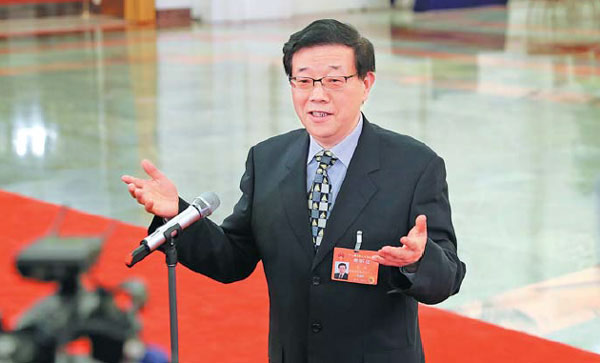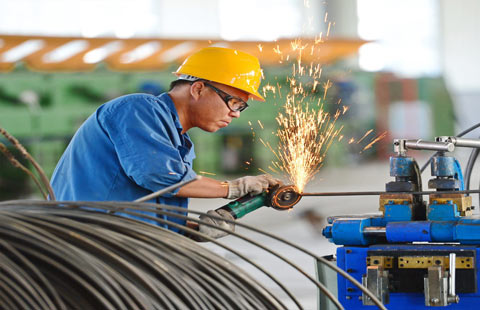Leaders focus on economic health, stabilization in 2017
 |
|
Li Wei, director of the Development Research Center of the State Council, answers questions regarding stabilizing the economy and improving efficiency during this year's two sessions. [Photo/Xinhua] |
The risk of a sharp decline in China's economy has decreased and the country is poised to embrace a new period of development focusing on quality and efficiency, the head of one top think tank said.
Li Wei, director of the Development Research Center of the State Council, said several factors-including the recent pickup of producer prices and the improving exports and imports this year-have shown that the Chinese economy is stabilizing and economic efficiency is improving.
While short-term economic fluctuations cannot be ruled out, the mid to long-term prospects will be relatively stable, Li said.
Li said the Chinese economy's focus on raising quality does not mean that the transition to a new growth model is complete, and he added that the country should prepare for future risks.
The head of the think tank warned of risk accumulation in the financial system against the backdrop of declining corporate profitability, excess speculation in financial markets and a rising leverage ratio in the corporate sector.
"If the regulators cannot act in a timely manner and improve the coordination of regulation, financial risks-especially liquidity risk-may emerge," Li said.
"The government should closely monitor the risks, prepare a contingency plan and improve regulations and mechanisms to dispose of the risks," Li said.
His comments reflected the increasing attention from China's top leadership on containing financial risks and curbing asset bubbles after a period of fast credit expansion to stimulate the economy.
Premier Li Keqiang said in the Government Work Report that China should build a "strong firewall" against financial risk, vowing to stay vigilant against non-performing loans, bond defaults, shadow banking and internet finance issues.
The government made containing financial risk a key task of this year at the tone-setting Central Economic Work Conference in December.
Uncertain external factors, including the pace of the rate hike by the US Federal Reserve, will likely complicate China's efforts to address financial risk, Li, head of the think tank, said.
More credit risks could also be exposed in the processes of corporate deleveraging and cleaning up loss-making "zombie" companies, he added.
While an accommodative monetary policy has helped stimulate economic growth over the past few years, side effects of surging property prices and growing asset bubbles have arisen, Li said.
"The government should work on its financial and land policies to curb the property bubbles without bursting them," he said.
Policymakers should move to establish a sound, long-term mechanism in the property market to prevent the risk contagion from spreading to the financial and other economic sectors, he added.
While acknowledging the achievements China has made in pushing supply-side reform, Li said the leadership should continue to deepen structural reform by efficiently disposing of zombie companies, cutting excess industrial capacity and prudently reducing the corporate debt level.
When it comes to reducing corporate burden, Li said more work needs to be done in cutting taxes and fees, as well as lowering production and logistical costs.
Finance Minister Xiao Jie said that the government will cut taxes and administrative fees by 550 billion yuan ($79.7 billion) this year to continue reducing corporate burden and will roll out favorable tax policies to support small, innovative technology companies.
The government has set the fiscal def i cit target at 3 percent of GDP this year, while adopting a proactive fiscal policy to facilitate the supply-side structural reform.
"But we should also be aware that tax cuts will likely be constrained by certain fiscal expenditures. It is a challenge to maintain the balance between fiscal revenue and expenditure," Li said.
Ren Xiaojin contributed to this story.
Contact the writer at lixiang@chinadaily.com.cn























